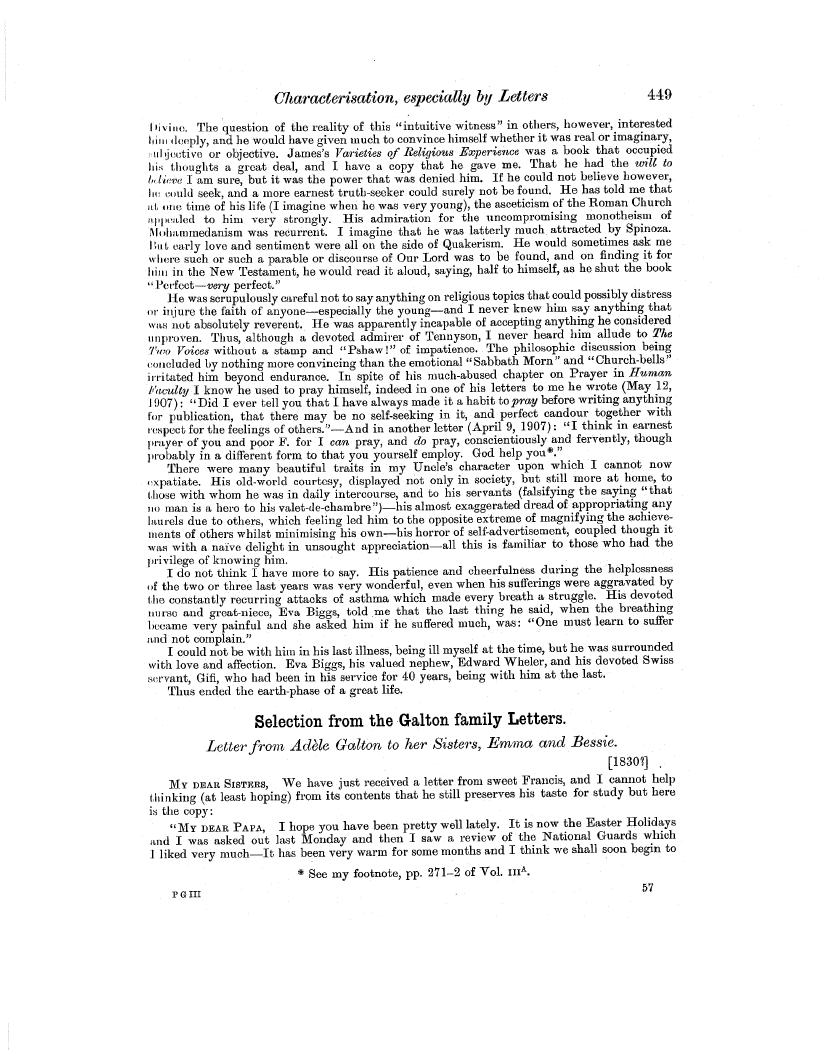| ||||||

OCR Rendition - approximate
Characterisation, especially by Letters 449 IJ vi no. The question of the reality of this "intuitive witness" in others, however, interested him deeply, and he would have given much to convince himself whether it was real or imaginary, rbjective or objective. James's Varieties of Religious Experience was a book that occupied Id, thoughts a great deal, and I have a copy that he gave me. That he had the will to lu.lteVe I am sure, but it was the power that was denied him. If he could not believe however, Ire could seek, and a more earnest truth-seeker could surely not be found. He has told me that at, one time of his life (I imagine when he was very young), the asceticism of the Roman Church ae,l,pealed to him very strongly. His admiration for the uncompromising monotheism of 1loharnmedanism was recurrent. I imagine that he was latterly much, attracted by Spinoza. (tut early love and sentiment were all on the side of Quakerism. He would sometimes ask me where such or such a parable or discourse of Our Lord was to be found, and on finding it for hini in the New Testament, he would read it aloud, saying, half to himself, as he shut the book "Perfect-very perfect." He was scrupulously careful not to say anything on religious topics that could possibly distress or injure the faith of anyone-especially the young -and I never knew him say anything that was not absolutely reverent. He was apparently incapable of accepting anything he considered unproven. Thus, although a devoted admirer of Tennyson, I never heard him allude to The Troo Voices without a stamp and "Pshaw!" of impatience. The philosophic discussion being concluded by nothing more convincing than the emotional "Sabbath Morn" and "Church-bells" irritated him beyond endurance. In spite of his much-abused chapter on Prayer in Human !Faculty I know he used to pray himself, indeed in one of his letters to me he wrote (May 12, 1907): "Did I ever tell you that I have always made it a habit to pray before writing anything for publication, that there may be no self-seeking in it, and perfect candour together with respect for the feelings of others."-And in another letter (April 9, 1907) : "I think in earnest prayer of you and poor F. for I can pray, and do pray, conscientiously and fervently, though probably in a different form to that you yourself employ. God help you*." There were many beautiful traits in my Uncle's character upon which I cannot now expatiate. His old-world courtesy, displayed not only in society, but still more at home, to those with whom he was in daily intercourse, and to his servants (falsifying the saying "that no man is a hero to his valet-(le-chambre")-his almost exaggerated dread of appropriating any laurels due to others, which feeling led him to the opposite extreme of magnifying the achievenients of others whilst minimising his own-his horror of self-advertisement, coupled though it was with a naive delight in unsought appreciation-all this is familiar to those who had the privilege of knowing him. I do not think I have more to say. His patience and cheerfulness during the helplessness of the two or three last years was very wonderful, even when his sufferings were aggravated by the constantly recurring attacks of asthma which made every breath a struggle. His devoted nurse and great-niece, Eva Biggs, told.me that the last thing he said, when the breathing became very painful and she asked him if he suffered much, was: "One must learn to suffer and not complain." I could not be with him in his last illness, being ill myself at the time, but he was surrounded with love and affection. Eva Biggs, his valued nephew, Edward Wheler, and his devoted Swiss servant, Gifi, who had been in his service for 40 years, being with him at the last. Thus ended the earth-phase of a great life. Selection from the Galton family Letters. Letter from Adele (Jalton to her Sisters, Emmna and Bessie. [1830?] MY DEAR SISTERS, We have just received a letter from sweet Francis, and I cannot help thinking (at least hoping) from its contents that he still preserves his taste for study but here is the copy: "MY DEAR PAPA, I hope you have been pretty well lately. It is now the Easter Holidays and I was asked out last Monday and then I saw a review of the National Guards which l liked very much-It has been very warm for some months and I think we shall soon begin to See my footnote, pp. 271-2 of Vol. IIIA. P G III 57
|